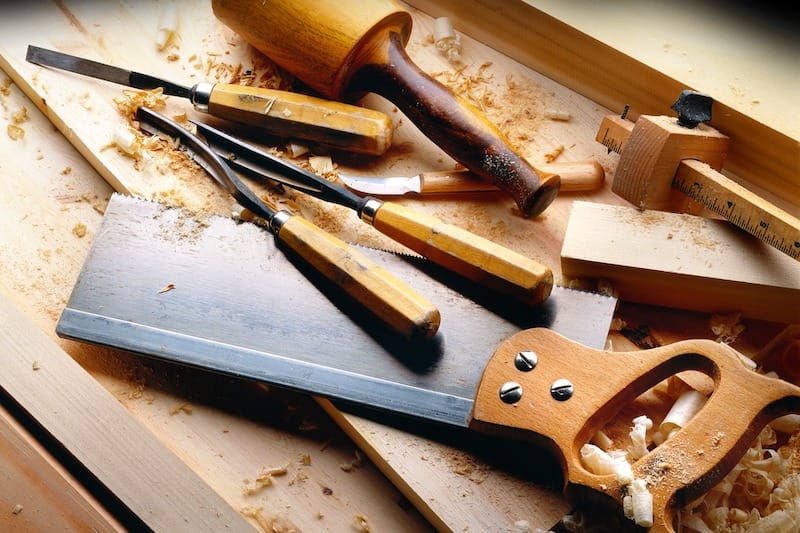
A survey in 2014 found 22% of children responding in the UK had an interesting aspiration for when they grew up: “I just want to be rich”. Another 19% wanted to be “famous”. More traditional answers like police officer, zoo keeper, firefighter, and doctor showed up lower in the survey. Can money really buy happiness? Read on to hear my answer in parable form.
The Parable of the Craftsmen
Years ago, two cousins left the small town they grew up in to pursue their dreams. Both had grown up watching their grandfather’s woodworking skills with wonder. His ability to give life, character, and purpose to pieces of wood inspired them and they both hoped to achieve his level of mastery on their own some day.
They both took jobs in a big company with fair, but unimpressive salaries. While they worked in the same office, they hardly saw each other, but they committed to meet on Fridays for lunch to talk about work, their life back home, and most importantly - their latest shop projects.
As the months went on and the cousins started to find their financial footing, their paths diverged. The older cousin was enthralled with the tools he could buy. With every paycheck, he diverted money to investing in his tool set, buying new chisels, saws, lathes, and drills. When he ran out of money to buy new tools, he pushed for overtime at work and promotions. The more he made, he reasoned, the better his workshop could be. With better tools, he’d be a better craftsman.
Over time, he filled his pristine workshop with the latest and greatest woodworking technology, neatly arranged like a catalog photo. He continued to chase promotions and invest in his career to fuel his hobby, amassing stacks of expensive wood alongside his tools.
The younger cousin, on the other hand, didn’t make nearly as much money and what he did make, he put into savings. He had the bare essentials of tools, but he maintained them well through the wear and tear of his continuous practice. He worked hard when at his job, but he left promptly at five every day to work in his tiny, saw-dusty workshop. He was constantly searching for deals on scrap wood. When he needed a replacement tool, he’d often barter a trade for one of his latest creations.
Years passed and the cousins neared their 20-year anniversary with their employer. In celebration, the company held a party and asked the cousins to provide pictures of their hobbies for a slide show.
The day of the party came and the business celebrated the two individuals with food, drinks, and speeches. It was obvious that the CEO had a greater affinity for the older cousin, after his years of dedicated service and countless hours in the evenings and weekends. The younger cousin, on the other hand, received heartfelt words from co-workers, often citing the amazing chairs, tables, garden boxes, and other items he had made for them as gifts.
Then came time for the slideshow. The older cousin’s slides were filled with images of his beautiful, dust-free shop. He showed off each piece of machinery with pride and he smiled as his co-workers “oohed” and “aahed” at the impressive shop.
The younger cousin’s slide show didn’t show a single tool. Instead, it contained image after image of his beautiful creations. An ornate wood pergola in a back yard, a warm and inviting farmhouse table, and the sturdy benches he had built for the local park many years before.
As the images floated by, the older cousin felt jealousy for the skill that his cousin had developed. How could it be, with his limited tool set, that he could create such amazing things?
The older cousin returned home that night to his workshop, dead set on showing up his younger cousin. He walked to the drafting table and stared at the blank piece of paper.
But no ideas came.
Convinced he needed to do something to get his creative juices flowing, he grabbed a piece of wood from the top of the pile and brought it to his latest shiny purchase.
He turned the machine on and paused. He stared at the settings, unable to decipher what they meant.
Angrily, he threw the wood, shut off the machine, and got in his car.
As he drove to the younger cousin’s shop, he felt a twinge of regret. The twinge turned into a flood as he recognized his failure.
Over the years, the older cousin had defined his worth as a craftsman by the quality of tools and size of his workshop. He’d pursued these so aggressively that he hadn’t spent the time actually working with wood, developing his skills and exercising his imagination.
Without these, he hadn’t developed at all in becoming a craftsman. He had just become a guy who owned a lot of expensive equipment.
He arrived at his younger cousin’s house and opened the shop door. He saw his cousin in the corner with an old chisel, carving out an inlay channel for the coffee table he was making.
The older cousin, finally calm and filled with a sense of clarity, approached slowly. As he sat down beside the younger cousin, he was struck with the gracefulness and precision of the movements.
Finally understanding, he turned to the younger cousin and asked, “Can you show me how to do that?”
Become a Craftsman with Your Money
Over our lives, it’s important to build up savings and investments. But it’s even more important to know what money is for and how to use it appropriately.
Money is a tool, nothing more. (Tweet this )
Money can be a valuable part of creating an amazing life, but only if we spend it with intentionality on our dreams and values.
We could spend our whole lives amassing a fortune, but if we don’t take the time to envision dreams and make them happen along the way, we’ll end up no better off than the older cousin.
On the other hand, if we’re disciplined with the resources we have, applying it first and foremost to our dreams and values, it’s possible to build a beautiful life regardless of your income.
Learn the Tools, Master the Craft
Whatever your situation, take the time to come up with dreams for your life and use your money to make them happen. Start small and practice. Pick a $100 dream you’d love to pursue and follow-through on it. As you check that one off, find the next dream and start pursuing that.
The more you practice, the more adept you’ll become at using the money you have and applying it effectively to achieving happiness.
When I was 5 years old, my mother always told me that happiness was the key to life. When I went to school, they asked me what I wanted to be when I grew up. I wrote down ‘happy’. They told me I didn’t understand the assignment and I told them they didn’t understand life.
Anonymous (sometimes attributed to John Lennon)
In the pursuit of meaningful, rich lives, we too often mistake the tools and resources as the goals (Tweet this ) . Remember that money is a resource, not an answer, and you’ll avoid the fate of the older cousin.
